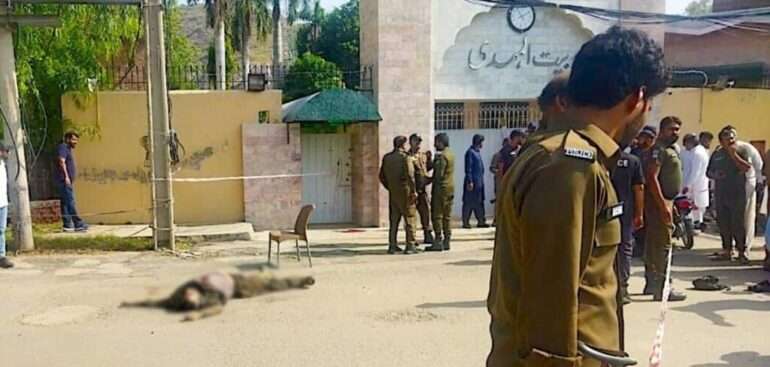On Friday, as worshippers gathered for Jumu’ah at the Ahmadiyya Muslim Community’s central mosque—Bait-ul-Mahdi in Rabwah’s Gol Bazaar—four men arrived by car, stepped out, and sprayed the main gate with gunfire. Panic cracked the air. Young Ahmadi volunteers on security duty moved first, shielding the crowd and trading their own safety for a few precious seconds of order. Police say one attacker was killed at the scene while three fled. Those volunteers were injured; by grace and grit, no congregant was lost.
Authorities later identified the slain gunman as 37-year-old Sohaib Bin Zaigham, based on identity documents, and launched a search operation for the remaining assailants. Officials descended on the cordoned streets, cameras rolled, and statements were issued. But the question that looms after the sirens fade is larger than a single incident: How many times will Ahmadis have to defend their own mosques before the state finally defends their right to exist?
This was not a random act of violence; it was the predictable outcome of a system that has made Ahmadis both hyper-visible and unprotected. For decades, Pakistan has codified discrimination against them—stripping them of the right to identify as Muslim, banning them from calling their houses of worship mosques, and criminalizing the very expression of their faith. You cannot criminalize identity and then feign shock when those so stigmatized are hunted at the threshold of prayer.
The state’s first duty is protection. Yet in Pakistan, Ahmadis are told to accept a deadly paradox: rely on the very institutions that have, in law and practice, marked them as suspect. The Ahmadi security volunteers injured on Friday are symbols of courage—but they are also symptoms of a broken social contract. In a functional republic, citizens attend Friday prayers with open hands; they do not stand at the gate, bracing for gunfire.
Leadership matters most when it refuses comfortable illusions. In his Friday sermon from London, the head of the Ahmadiyya Muslim Community, Mirza Masroor Ahmad, condemned the attack and called out the Punjab government and its chief minister, Maryam Nawaz, for failing to protect Ahmadis. His rebuke was not political theater; it was reality testing. Any claim that “crime has been eradicated” dissolves against the muzzle flashes at Bait-ul-Mahdi. If the law’s protection falls silent the moment an Ahmadi bows his head, then the law has become selective—loud for the majority, muted for the minority.
Officials will insist that a search operation is underway, that suspects will be apprehended, and that justice will be done. But response is not the same as protection. Protection is what prevents an attack; response is what follows a failure to prevent one. Protection is rewriting the rules that prime a community for violence, closing the pipeline from pulpit to poster to post that normalizes hate, and making incitement costly—legally and politically. It is not enough to tape over bullet holes while leaving the legal scaffolding of discrimination untouched.
What would real protection look like? First, the state must end the criminalization of Ahmadi religious life. So long as the law polices their words, signage, and rituals, extremists will read that policing as license for violence. Second, authorities must prosecute incitement with the same zeal often directed at policing Ahmadi worship—especially sermons, posters, and social-media content that call for harm. Third, security coordination must be proactive and transparent: visible protection at vulnerable sites, trained liaison teams, and clear, public commitments that attacks on Ahmadis will be treated as attacks on the state itself.
There is, too, a moral argument that should not require a lawyer to translate. A government that cannot guarantee a citizen’s safety at prayer has forfeited the moral claim to govern that citizen. The measure of a state’s strength is not the decibel level of its boasts, but the quiet with which minorities can live—how safely a mother can send her son to Jumu’ah, how confidently an elder can walk through a mosque gate without scanning the street for a car that might not stop.
Some will caution that these are sensitive times, that reform is challenging, and that public sentiment is complex. None of that absolves the state of its duty. The longer Pakistan tolerates a two-tiered citizenship—one tier allowed to worship, the other forced to apologize for it—the more it hollows out its own promise. Today, Ahmadis stand in the crosshairs. Tomorrow, it will be another community, and then another, until the circle tightens around everyone.
The shots fired at Bait-ul-Mahdi did more than tear into a gate. They pierced the illusion that Ahmadis can be both criminalized and protected. The attackers fled into the streets. The state must not escape from its responsibility. Protection is a choice. So is neglect. Pakistan must choose.
